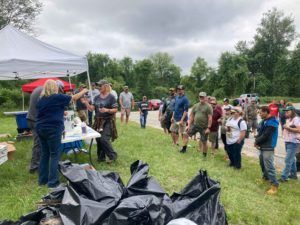Michigan and The National Wild and Scenic Rivers System
In 1968, Congress passed the Wild and Scenic Rivers Act establishing the National Wild and Scenic Rivers System (NWSRS) to preserve free-flowing rivers for the benefit and enjoyment of future generations. The Wild and Scenic Rivers Act protects more than 13,400 miles of rivers and streams in the U.S. The Forest Service is involved in managing over 5,000 of those wild and scenic rivers miles.
What designates a wild and science river though? Well, they have remarkable scenic, recreational, geologic, fish and wildlife, historic or other similar values that led our government to add these waterways to the NWSRS. While some of these rivers are closed to recreational activities, many of them are open to the public.
In Michigan, there are currently 16 rivers that are included in the NWSRS. The Forest Service works with the public to ensure that the free-flowing conditions, water quality, and outstandingly remarkable values of these rivers are protected from overuse, instream developments, and other impacts that do not enhance these values.
 One of these rivers is the Manistee River, which has a total of 26 miles of recreation that we can use for public enjoyment. MUCC’s On the Ground program has collaborated with Steelhead Manifesto for seven years to host volunteer efforts to keep the Manistee clean. Join us this year as well to help keep trash out of our historic rivers.
One of these rivers is the Manistee River, which has a total of 26 miles of recreation that we can use for public enjoyment. MUCC’s On the Ground program has collaborated with Steelhead Manifesto for seven years to host volunteer efforts to keep the Manistee clean. Join us this year as well to help keep trash out of our historic rivers.
If you are interested, please click HERE. Hope to see you there!
The post Michigan and The National Wild and Scenic Rivers System appeared first on Michigan United Conservation Clubs.
Recent Posts



